What this ultra-processed-food guru is eating at Christmas will surprise you
Chris van Tulleken stressed us all out about ultra-processed food. So what’s on his table on the 25th? A surprising amount of stuff in foil trays from the supermarket.
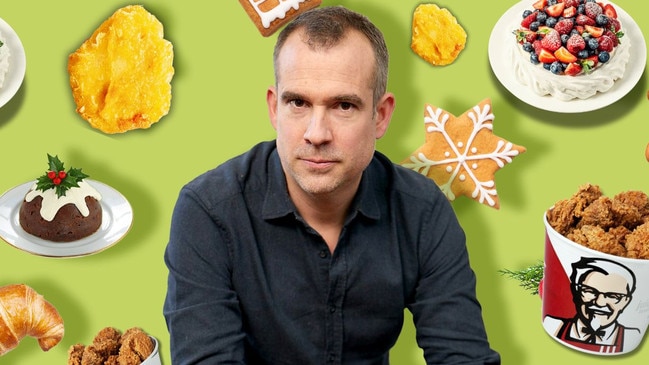
I had not been looking forward to meeting Chris van Tulleken. As the television doctor strolls into the room, all smiles and eye contact, it’s clear he’s a charismatic, handsome and (slightly) younger man — all of which is annoying, but not the reason I’m hesitant. That is because of his best-selling book. I read Ultra-Processed People, a few months after everyone else did, but very quickly a lot of the food I had once very much enjoyed — the naughty food, the nice food, sadly the same thing — lost its appeal.
Van Tulleken’s method is strikingly straightforward: keep eating what you’re eating while you read the book but pay close attention to the ingredients. That’s all I did. That’s all I needed to do.
The average adult in the UK consumes 57 per cent of their calories from ultra-processed food (UPF). It rises to 65 per cent for children. I’d assumed my middle-aged, middle-class dad diet — more cook-from-scratch dinners than not, but dodgy on vending machines and lunch deals — was better than average. On close examination it was, but not by much: about two fifths of what I ate contained ingredients not found in a home kitchen. Shorthand for UPF.
Following Van Tulleken’s simple edict, mealtimes and snack attacks became an exercise in trying not to puke. My once-favourite crisps contain maltodextrin, a dietary saccharide that promotes salmonella and mucosal colonisation in the mice it was tested on. Barf. The ice cream I was about to serve the children contains xanthan gum, a slime bacteria exude to help them cling to surfaces. Hurl. “Think of xanthan gum when you next scrape the accumulated gunk from the filter on your dishwasher,” Van Tulleken writes. There was so much more but I don’t want to put you off your carboxymethylcellulose.
For Van Tulleken, 46, the epiphany came when he pulled into a service station and ordered the same KFC hot wings he’s bought — and loved — since he was 15. “I had been speaking to this phenomenal Brazilian scientist, Fernanda Rauber, about ultra-processed food,” he tells me. “Every time I said ‘food’ she corrected me. ‘Not food,’ she’d say. ‘Industrially produced edible substance.’ Over and over. Then, at the service station, I had this moment of clarity. I couldn’t eat the wings. I just couldn’t stomach them.”
My own epiphany came shortly after I’d popped a tube of Pringles, those incredibly moreish, incredibly processed hyperbolic paraboloids. After I’d read through their long list of ingredients and Van Tulleken’s accompanying notes on how those ingredients made them irresistible, I discovered I could stop very soon after I’d popped.
All of which is why I was reluctant to meet him only a few days before Christmas. What if he ruins that too? What if he says something about Lidl’s figgy pudding? Or those M&S canapes that are always on four for three? I’m going to end up making my own Thai prawn skewers on Christmas Eve, aren’t I?
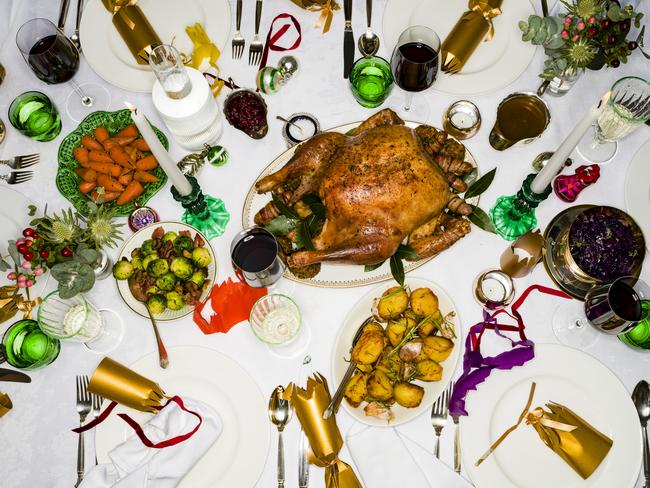
We meet in a library room at the Royal Institution in central London, where Van Tulleken is preparing to give the Christmas lecture — an honour that has been bestowed on the best science communicators since 1825. When Sir David Attenborough did it in 1973 (on “the languages of animals”), he had a skunk for a prop. Van Tulleken will have his identical twin brother and children’s TV co-presenter, Dr Xand. They’ll use a “pill camera” to “delve deep into our guts”, which should go down well with the 11 to 17-year-old audience. He will also feed worms and (foul-smelling) durian fruit to his infant daughter to demonstrate how what we eat is conditioned (or not) by experience and environment.
The goal of the lecture is to show how food has shaped human evolution, how it has changed beyond recognition over the past 60 years, and how we can eat better in the future. He is also promising, he says, “festive food hacks”.
By which, I presume, he means tricking us into eating healthily using only ingredients found in normal home kitchens. Bah, humbug. So let’s get this out of the way. “What’s allowed on Christmas Day?” I ask, expecting all sorts of Ebenezerish self-denial.
“Get it all preprepared,” he says without hesitation. “Go to the supermarket of your choice, get everything in foil, take it out of the foil and put it in the oven. Have a very merry processed Christmas.”
This is a surprise. The man who has permanently changed my diet is recommending ready-made. What about all the filthy additives that will damage my microbiome and cause my gut to leak? I don’t want my gut to leak for Christmas, Chris.
“It’s the one day of the year when you can spend a bit of meaningful time with the people you love,” he insists. “You don’t want to spend it in the kitchen.”
Then comes a genuinely dastardly revelation. Van Tulleken doesn’t serve turkey, he serves “micro-turkey”. Last year he prepared two of them for the whole family, including his parents and his in-laws. These very expensive rare-breed birds, he told them all, were hand-reared to their boutique size, “and everyone said it was the best turkey they’d ever eaten”. Almost a year on he is yet to clarify that the micro-turkeys were just normal-size chickens, “which everyone prefers anyway”. With food, as we shall see, it’s all about the marketing.
Van Tulleken did not set out to be a campaigner. He grew up in southwest London, the son of an industrial designer and an editor. Like his brother he trained at the University of Oxford before becoming an infectious diseases doctor at the Hospital for Tropical Diseases in London.
In 2012 the twins began to present Operation Ouch! on CBBC. Grown-up television such as Is Binge Drinking Really That Bad? (in which Chris drank moderately and Xand did not) and The Doctor Who Gave Up Drugs (in which Chris tried to find nonpharmaceutical ways to treat his patients) quickly followed.
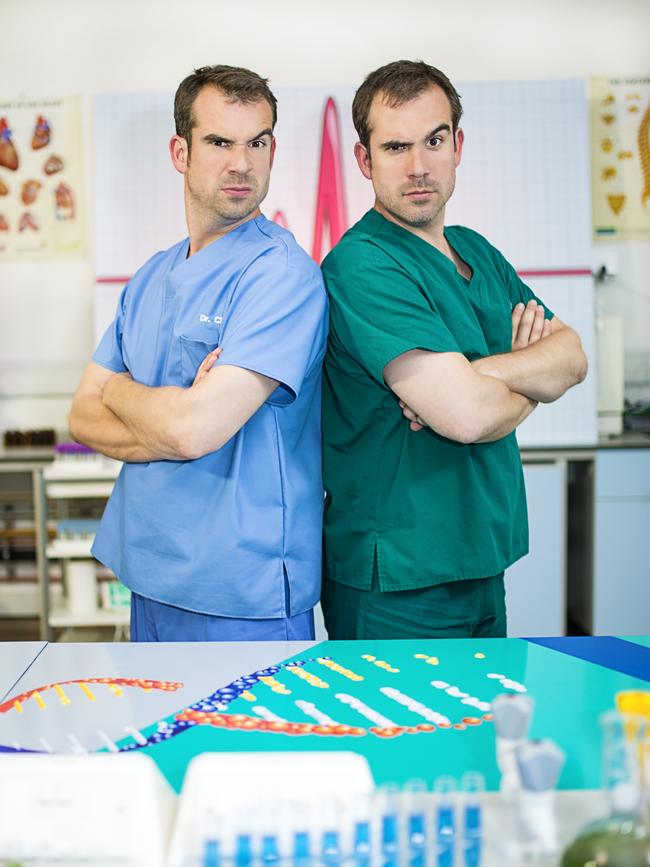
With the publication of Ultra-Processed People, which remains on the bestseller lists 18 months on, Van Tulleken has found himself at the forefront of a growing campaign for regulation of the (not-)food industry. He lives and eats by the cause that has become all-consuming since he began his research into Big Food. This morning he made porridge for his three daughters and served it with maple syrup — “they’re allowed to free-pour and they don’t pour much”. For lunch he’ll feast on nuts and “maybe a banana” because sandwich deals, I’m sorry to say, are out.
When he first began promoting the book in April 2023 he’d show journalists “a big bowl of crappy snacks and sweets” kept on the kitchen table. “It was my Rishi Sunak ‘I’m a man of the people’ bit,” he says. “We’re normal. My kids eat sugar.” Like Sunak, that bowl is long gone now — “It was really harmful stuff and the children were digging in when they got back from school. We got rid of it and there was 24 hours of protest, and then they accepted it.”
No one in his family has escaped the de-UPFing. “I’ve become an appalling fascist about it in the house,” he says. His wife, Dinah, a fashion editor, gets an eyeroll if she suggests Pret a Manger and Xand has also been encouraged to improve his diet. A couple of years ago the identical twin was not identical at all — he weighed 20kg more than Chris, putting him at the oversubscribed clinically obese end of the seesaw. Today, having deprocessed, it’s harder to tell them apart again.
All change then for the Van Tullekens. Even his mother, an “excellent cook herself”, has been subjected to the ingredients Stasi her son has become. But when, given all this, I suggest personal choice has its part to play — by all means have UPF taxes and pictures of diseased rectums on ready-meal packaging, but let’s also take some responsibility for what we eat — he’s quick to point out the limitations.
“More than a million families in the UK don’t have either a fridge or a stovetop cooker,” he says. “So if you can only cook in a microwave, your options are limited. And many people, if they don’t own a car, cannot get somewhere easily where they can buy something that isn’t ultra-processed. They can’t buy real food because they’re shopping from a shop at the bottom of their block of flats.”
Even with wheels and a cooker it has become much harder to find food that isn’t ultra-processed, he says. “My research group at University College London [where he got his PhD in molecular virology] has just done some modelling with the World Health Organisation and we can show that, using just calories, fat, salt and sugar, 99 per cent of UK food is excessive by the UK’s own guidelines. So when the British Nutrition Foundation says baked beans or fishfingers on wholegrain toast is a healthy meal — it just isn’t. It’s still very high in salt, very high in sugar and extremely energy dense. The problem is that, for many people, it’s the best food they can afford.”
But it can’t be that hard to eat healthily on a budget?
“If we brought in warning labels and used our own UK nutrition guidance, the entire supermarket would be covered in black octagons,” he says. “People would just ask, ‘What on earth am I meant to eat?’ We need to do it in a stepwise way. We need to give the companies a bit of time to change.”
At whatever point tobacco-style warning labels are introduced, he is clear about one thing: when a product carries that warning, it should be banned immediately from being marketed and advertised to children.
“The last time I looked at a box of Coco Pops it had 12 health claims,” he says. “It supports your family’s health! It supports your children’s bones! Fifty per cent of your daily vitamin D! There’s no regulation of what they can write on the box. They’ve got a cartoon monkey on there saying it’s healthy, but it has more than three times the free sugar it should have to be compatible with a healthy diet.”
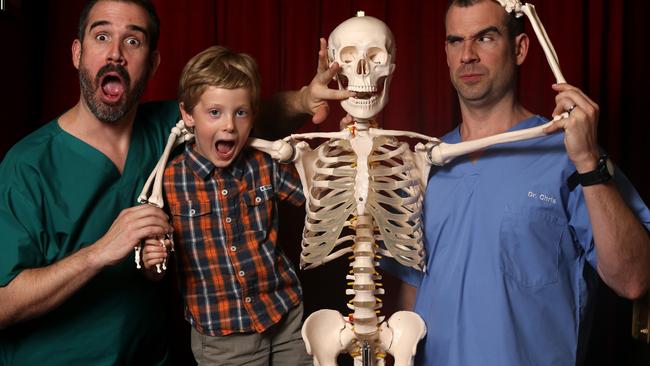
It is more or less impossible for his seven-year-old daughter to stop eating Coco Pops after one 30g portion, he adds, and I tell him my middle teenager is “a disaster” when it comes to junk food. Again, he says, it’s not his fault — something I won’t be passing on.
“Every single aspect of every product you eat has been trialled and tested,” he says. “From the click that the ring-pull makes to the colour of the packaging right through to the fat, salt and sugar ratios, the acidity, the textures, the moisture, all of it — there are thousands of properties to every product and every single one has been optimised in laboratories. One scientist who had worked for Unilever told me they put people in MRI scanners and fed them ice cream. He said their reward centres ‘lit up like a furnace’.”
My 15-year-old and Van Tulleken’s 7-year-old are up against a team of neuroscientists armed with MRI scanners. They don’t stand a chance.
The problem, therefore, is not personal and his primary target is the food industry. “Ultra-processing has nothing to do with extruding food in a machine,” he says. “It is a set of design and marketing technologies to produce products and goods with which you can’t stop interacting.”
He goes on to point out that the World Health Organisation’s annual operating budget is $8 billion or $10 billion a year. “Nestlé’s annual spend on promotions and marketing varies depending on what you include, but it’s somewhere between £10bn ($A20bn)and £20bn. And that’s just one company.
“Until you frame obesity as not just similar to but exactly like lung cancer you will not solve the problem,” he continues. “And I am somewhat hopeful the government will see that the tax revenue they get from these companies is a fraction, not even an integer percentage, of the bill that we all have to pick up. Obesity alone now costs us £100 billion a year. That’s before we discuss the cancers and the anxiety and the depression and all the other issues linked to UPF.”
Every policy plan since the 1990s, he adds, has explicitly brought industry into the room. “These companies definitely want to be inside the tent and that is the most important thing to prevent,” he says. “In my very strong opinion corporations that cause problems cannot fund the solutions to those problems.” I point out that McDonald’s sponsors my son’s cricket team. He points out that if you go to Coca-Cola’s website you’d think its main business is saving the planet. We both shrug at the sheer brazenness of it all.
Once he pops, it’s quite hard to get Van Tulleken to stop. He has spent long days with his publisher’s lawyers wading through “vexatious” complaints about allegations in the book but he has so much more to say about the food industry’s soft power — he’s been invited on numerous all-expenses-paid trips and offered lucrative fees to “work with supermarkets”.
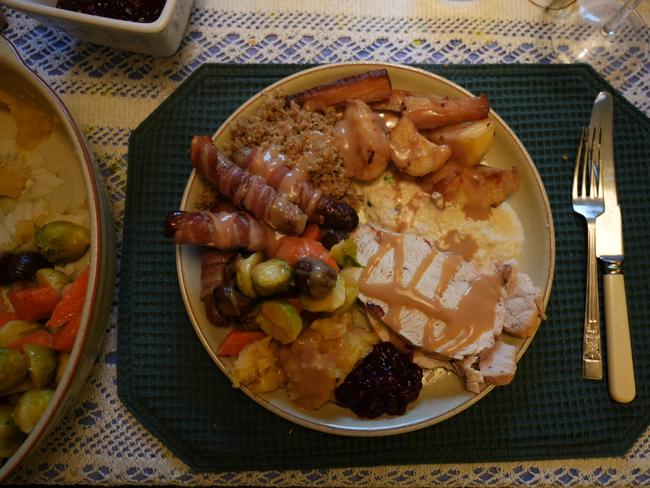
It would be easy (and well remunerated) for him to take up advisory roles inside the industry — to try to effect change from the inside. It’s something far too many academics already do, he says. “I know the industry is never going to pick a fight with me directly,” he says, “but Big Food will fund an academic who can mount what sounds like a credible case against what I’m saying.”
This is the point in our conversation when he stops sounding like the perfectly reasonable, impeccably mannered, irritatingly nonjudgmental medic and starts sounding quite exasperated. He will tone down his missionary zeal for the Royal Institution lecture — it is Christmas, after all. But we conclude on a more positive note. In his experience — and mine — children do want to eat healthily and he expects to leave his young audience with a greater understanding of what that entails (after the section on entrails).
All he needs to do is hold up some chicken nuggets and start talking about gunk. That worked for me. I’ll never eat nuggets again. Or Quavers. Or stuffed pasta. Or mayonnaise. Or, sniff, Haribo Starmix sweets. And it’s working for my children. Try it at home. At dinner, read a bit of Van Tulleken on the flavour enhancers, emulsifiers, sweeteners, thickeners, stabilisers, acidity regulators, foaming agents, anti-foaming agents, bulking agents, carbonating agents, gelling agents, glazing agents, bleaching agents, leavening agents and clarifying agents.
It’s surprising how quickly the kids — even the middle one — would much rather have broccoli.
The Sunday Times
RESOURCES
The Royal Institution Christmas Lectures 2024

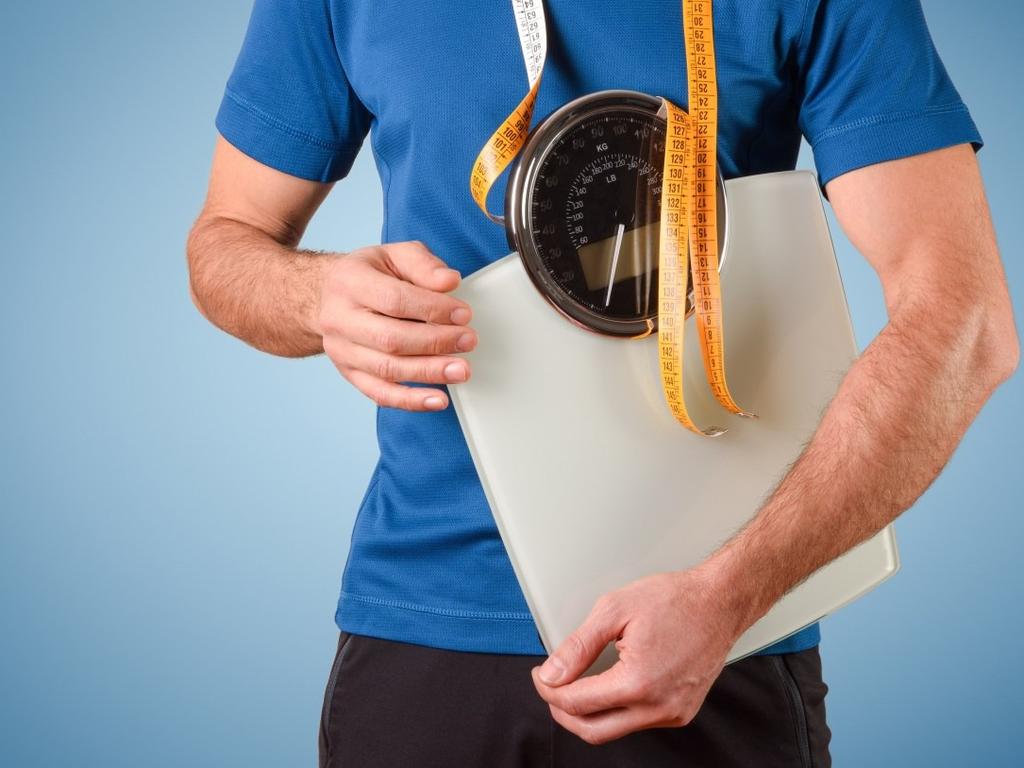


To join the conversation, please log in. Don't have an account? Register
Join the conversation, you are commenting as Logout